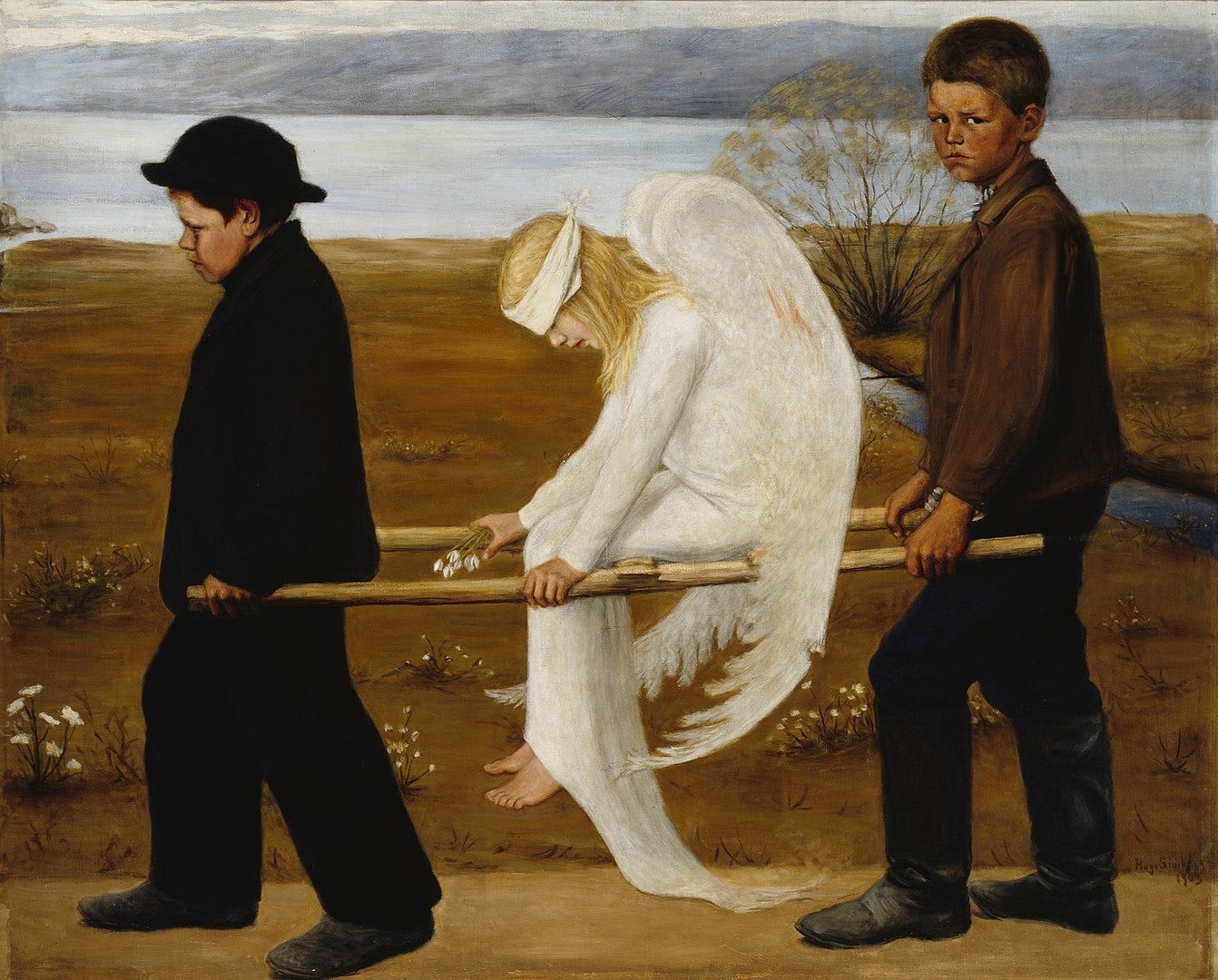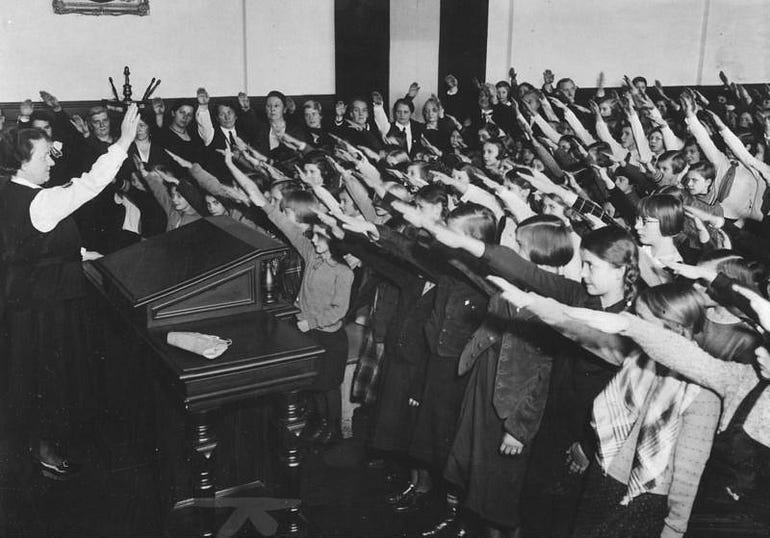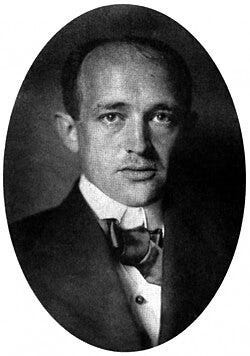
If you enjoyed this article, please share it with a friend or consider becoming a paid subscriber.
All across America, decent people are asking their friends not to talk about politics. They say they want to focus on the good — places filled with light, not shadows; hope, not fear. I understand the impulse. Who wouldn’t want that?
But if fear is a contagion, so is compliance.
You can wall out the headlines. You can mute the political discussions. You can tell yourself that kindness and good intentions are enough. You can go silent.
But the fire doesn’t stop burning just because you close your eyes.
It grows.
There’s a name for this kind of silence — quietism. Quietism is a passive, withdrawn attitude toward worldly affairs. It’s the art of retreat — retreat into the self, into family, into hobbies, into career anxieties, weekend plans, and garden parties. It is the desperate insistence that one’s personal peace is worth more than the collective good. It is the belief that Democracy is a background noise you can mute at will without consequence.
In small doses, it’s understandable. Necessary, even. But when whole communities choose quiet over truth, and comfort over courage — that is how democracies die.
I experienced quietism firsthand in my private writer’s groups — a circle of talented, kind Democrats who flatly refuse to engage in any political discussions. At first, I understood. People needed safe spaces, or so the logic went. A place to talk about your joys and struggles, the weather, publishing industry gossip, or whose agent ghosted who — anything except the slow-motion demolition of America.
For a while, I played along. I smiled and nodded through the baby announcements and industry gossip, ignoring the lump in my throat. But as the weeks passed and the assault on democratic ideals grew louder, I found myself contributing less and less.
Eventually, I muted the chat.
It wasn’t that I didn’t care about my friends’ personal lives. I do. I always will. But when the world is on fire, chirping endlessly about your flower garden while refusing to acknowledge the flames feels obscene.
I’ll be blunt. I’m disappointed in that group. Some of them may read this and feel I’m judging them unfairly. Maybe I am.
But here’s what I do know: It’s possible — and necessary — to find a balance between healthy outrage and stoic acceptance. You can enjoy your life while recognizing the suffering of others. You can share your personal joys and struggles, without secluding yourself into a bubble of silence and delusion. Not talking about it doesn’t make it go away.
Because here is the cruel irony: the quietist think they are protecting themselves — their jobs, their families, their little corners of America. They think it won’t touch them.
They are wrong.
Many Americans seem to have forgotten that Democracy is a participatory sport. Many did not participate in the last election and chose not to vote.
Many are still not participating.
But if the quietists want to continue to check out, mute the news, pretend the suffering isn’t real, and enjoy their private peace — fine. But don’t pretend you are innocent. Don’t pretend your silence doesn’t make you complicit. Because it does.
Do you know what the ancient Greeks, the birthplace of Democracy, called people who didn’t participate in government?
Idiots.
The word idiotes in ancient Greek didn’t mean someone who was dumb. It meant someone who withdrew from public life, who kept to their private affairs while the city burned around them. Someone who refused to serve the common good.
It isn’t anger and hatred that topples democracies. It’s apathy. It’s the deadening hum of American “idiots” telling themselves it’s not their business.
Too harsh? Perhaps. Let’s break for some history, and I will let you decide.
The Diary of Friedrich Reck-Malleczewen
Friedrich Reck-Malleczewen could have survived.
By 1936, he had witnessed the rot curling out. “You made this monster, and as long as things were going well, you gave him whatever he wanted,” he wrote, disgust curdling his pen. “ You turned Germany over to this arch-criminal, you swore allegiance to him by every incredible oath he chose to put before you — you, officers of the Crown, all of you.”
Reck, a German theater critic, solider, and ship’s doctor, didn’t take up arms against the Nazis. He took up something far more dangerous — his pen.
Every page he filled in his diary, he risked his life. Every sentence was an act of sabotage buried like a landmine under a regime built on lies. He hid his diary under floorboards, in tin boxes, in the woods, knowing that even a casual discovery by a neighbor could earn him a noose around his neck.
“Germany has been sinking deeper and deeper into unreality,” Reck wrote acidly, “ It is now completely drugged on its own lies.”
At one point, Reck had the opportunity to shoot Hitler. He didn’t take it. He would later regret his inaction.
Instead, he watched his neighbors, the shopkeepers, the professors, the “good Germans,” morph into something callous — not because they were all bloodthirsty fascists, but because they were cowards. Because they preferred the warm anesthesia of denial to the cold discomfort of defiance.
Of course, it’s easy, from a safe historical distance, to imagine 1930s Germany as a nation overrun by cartoon villains — mobs of howling ideologues, arms raised, faces twisted, a nation possessed by hatred. But the truth is not so cinematic. It is quieter and far more horrifying.

Most 1930s Germans were not radicals. They were not thirsty for blood.
They were not Nazis.
They were folding laundry, tending gardens, worrying about bills, and scolding their children for muddy boots. They were ordinary people who chose, almost imperceptibly at first, to pull the curtain against what was happening just beyond their doorsteps. They convinced themselves that politics was grubby, complicated, and best left to the professionals. They muttered “what can you do?” over weak coffee and the clink of teacups, even as the bricks of their neighbors’ shops cracked and crumbled under the fists of men in uniform.
The rot Friedrich-Reck smelled was not the stench of evil made visible; it was the slow, musty seep of a people abandoning their own consciences. The more conformity spread, the easier it became to surrender. Every shrug, every averted gaze, every neighbor who stayed silent when the Jewish family disappeared in the night — it all knitted together into a new normal.
Eventually, resistance didn’t just seem dangerous; it became absurd.
By the time the violence was naked, it no longer shocked. It had already been absorbed into the furniture, like smoke into drapes, until the entire house stank and nobody noticed.
“On the day Hitler came to power, I could count on my fingers the number of acquaintances who were capable of predicting the catastrophe that Germany was running toward.”
-Elisabetta Cerruti, Wife of the Italian Ambassador in Berlin
Will America Get Vichy?
Across the border in France, capitulation wore an even more bureaucratic face. When the Nazis entered, the government in Vichy did not crumble under the boot.
It curtsied.
Secretaries, postmasters, clerks — ordinary men and women with ink-stained fingers and tidy desks — became collaborators, processing their fellow citizens with the mechanical efficiency of an assembly line.
Philosopher and historian Hannah Arendt would later call it “administrative murder,” and that was no metaphor. Human lives were dispatched not by bullets alone, but by forms filed in triplicate, by polite signatures executed in blue-black ink, by the click of a rubber stamp descending on paper like a guillotine.
Again, it wasn’t merely terror that drove the surrender. It was imitation. When you see your neighbor comply, you begin to feel that compliance must be reasonable.
If everyone else is bowing, only a madman stands tall. The horror was not just that evil triumphed — it was that it began to look respectable.
Later, scholar Elisabeth Noelle-Neumann would name this sickness: The Spiral of Silence. In 1974, Noelle-Neumann gave words to what Reck had witnessed with his own failing hope — that when people believe their views are unpopular, they retreat into silence. And as they withdraw, the illusion of consensus strengthens, until silence becomes not only self-protective but contagious.
The more mouths closed, the fewer voices there were to break the spell.
The fewer voices spoke, the louder the lies became.
The louder the lies, the harder it became to remember there had ever been truth.
When silence gets louder than defiance.
There may come a day when we can no longer voice our political opinion.
Take the recent immigration cases. On the far right, the men deported to an El Salvadoran gulag are hardened criminals and gang members coming for your wives and children. On the far left, they’re wholesome family men ripped from their churches. Both sides spew their headlines. Neither side gets it fully right.
But here’s the truth: All the court records are public. All of them are available, boring, and bloated with legalese, free to anyone who actually takes the time to look.
If you do — if you bother to read them — you’ll find that Kilmar Abrego Garcia, the man at the center of this storm, is a legal resident, a union worker, a father, a husband married to an American, and has no criminal record. Garcia is not MS-13. He is not a saint either. He is a human being, caught between the grinding gears of political hysteria.
I was taught you don’t condemn someone until you know the facts. And if you don’t have the facts? You shut up and listen until you do.
But today, social media has obliterated that discipline. Today, the loudest, most histrionic liar wins the attention economy, and facts are treated like an inconvenience — or worse, an afterthought.
Maybe later, some revelation will come out that Garcia was secretly kicking puppies, abducting children, and setting churches on fire. Maybe.
But that is not the point.
The point is due process — the simple, radical idea that evidence must come before verdicts, not the other way around.
Ted Bundy got due process. Trump, convicted felon and adjudicated rapist, got due process. Every human being under the Constitution is entitled to it, because without that foundation, Democracy is just an auction block for power.
And to the MAGA faithful: You think you want a dictatorship. You think you will fare better under an authoritarian regime.
I assure you. You won’t. A thousand years of history says you won’t.
But if you don’t like living under a government that values due process, planes are leaving for Russia every day. Go. You’ll love it there. They don’t bother with trials. They don’t bother with facts. They just disappear people or throw them out a window, and no one ever bothers you about it at the dinner table.
Because when the President of the United States ignores the Supreme Court and tears up due process like it’s a parking ticket, he’s not being “tough.” He’s staging a coup in slow motion.
He’s inviting dictatorship.
And he’s not even being subtle about it. When Trump says, “He who saves his Country does not violate any Law,” people should believe him. Laws do not matter when a dictator is the knighted savior.
Case in point: In a recent interview with Time, Trump was asked about a portrait he added to the Oval Office of John Adams, the president who once declared, “We are a government of laws, not of men.”
The reporter had a simple question: Did he agree with John Adams?
Trump paused — confused, unsure where the painting even was — and finally said he didn’t agree “100 percent.”
“We’re a government ruled by law,” he said, “but somebody has to administer the law…men and women certainly play a role. Ideally, you’re going to have honest men like me.”
In less than a minute, Trump dismantled the foundation of American Democracy — the idea that no one, not even a president, stands above the law — and replaced it with himself. The man with 34 felonies is now deciding who is and isn’t a criminal.
Last week, the Trump regime deported the first American citizen.
It always begins with one.
When you decide that one man’s power matters more than our Constitution and the law itself, you have already planted the seeds of your own destruction. Democracies do not crumble all at once. They die in inches, in bored sighs, in shrugged shoulders, in the endless, terrible quiet of people who think it’s someone else’s problem.
Courage then becomes rarer and rarer, partly because cowardice is communal. You do not have to believe in tyranny to strengthen it. You only have to decide — quietly, politely, regretfully — that speaking out is too much trouble.
You only have to tell yourself that keeping your head down is neutral. That you are simply minding your own business, while the business of Democracy bleeds out unnoticed at your feet.
“A sickness has seized this country. It has corroded the mind, paralyzed the soul, and turned the heart to ice.”
— Friedrich Reck-Malleczewen, Diary of a Man in Despair

The knock at the door
Reck didn’t live to see the end of the war.
One night, the knock came. Someone — a neighbor, a colleague, a man with his own debts to pay—had pointed a trembling finger in his direction. He was dragged to Dachau, where his name was stripped away along with his body, his dignity, his life. Reck died just months before Germany’s collapse.
But the diary — the buried Tell-Tale Heart of him — lived.
It surfaced, years later, pulled from the soil by hands that could still feel the pulse in its pages.
He had written it for us.
A message smuggled across time, still ticking in the dark. His words — furious, bitter, unrepentant — survived him, a testimony to what happens when too many people decide that staying out of politics is the polite thing to do.
Friedrich Reck-Malleczewen could have survived.
He could have swallowed the slogans, pretended not to hear the boots, let the filth of history sluice past him while he tended his gardens, fed his dogs, and nodded politely at the neighbor with blood on his shoes.
Instead, he chose the slow death of honesty. He chose to remember when it was safer to forget. He chose to see when blindness could have brought him peace.
While Americans remember Anne Frank’s hidden diary chronicling the cruelty, we forget Reck-Malleczewen’s — the diary of a man who knew exactly who had helped Democracy die: the ones who stayed quiet as the trains carted people to their deaths.
Recording the truth wasn’t a matter of principle for Reck. It was a matter of breath. It was how he stayed human in a country that was systematically stripping humanity away, atom by atom. Every entry he scratched into his diary was a match struck in a blackout. Every observation was a thread tied back to sanity, growing thinner and thinner as the world howled around him.
Reck-Malleczewen didn’t topple a regime.
He didn’t save his neighbors.
He didn’t survive.
But he did something almost as rare. He left behind a map — a record of how a civilization dies not from external conquest, but from within, crushed under the weight of cowardice.
It wasn’t mass hatred that hollowed out Germany.
It was mass quiet.
It is always the quiet that kills first.
All the apolitical people ignoring the news and refusing to take a stance can stay blissfully unaware that history is unfolding.
But know this: Democracies do not topple in a single pivotal moment. It’s not “where were you when JFK was shot?” or “when the twin towers fell.” It’s the slow walk toward genocide in which our grandchildren look back and ask — why didn’t you stop them?
Carlyn Beccia is an award-winning author and illustrator of 13 books. Subscribe to Conversations with Carlyn for free content every Wednesday, or become a paid subscriber to get the juicy stuff on Sundays.






Carlyn, I love your brutal analysis. I completely agree. Great story from Germany, I admire the parallel though it hurts. I lost three family members
In Holocaust executed by Germans in Dnepropetrovsk, Ukraine, back in 1941.
I used to study History being a student and learned to rely on facts, and verify sources. I hope love to freedom will overcome the described quietism and America will be back. It’s painful to comprehend the comparison of Nazi regime and America 2025.
“When you’re gonna wake up and strengthen the things that remain” (Bob Dylan) Sergey, from Ireland ❤️
Hitler's Germany is NO stretch! I read that 3per cent of Americans closely follow politics. Trump can do, and is doing things at a speed Hitler could never dream of. All hail AI.